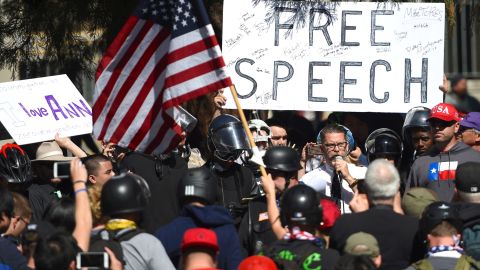Prejudiced People Invoke “Free Speech” to Mask Their Racism, Says Study

A new study says that some people who claim to be for “free speech” when defending racist language do not really care about all speech, just the speech which agrees with their point of view. In fact, the researchers say that in such cases it often comes down to “racists defending racists”.
The study was carried out by the graduate student in psychology Mark H. White and psychology Professor Christian Grandall from the University of Kansas. They found “explicit racial prejudice” to be a pretty good predictor whether someone would use the “free speech defense” to defend racist attitudes.
The study saw that those with high levels of prejudice were very concerned with freedom of expression. They were also less likely to defend “free speech” in principle when faced with non-racial scenarios, suggesting that “freedom of speech” was more of a convenient rhetorical point, utilized when it suited them.
“When people make appeals to democratic principles — like ‘freedom of speech’ — they don’t always represent a genuine interest in that principle,” said White. “We think of principles as ideas we use to guide behavior in our everyday lives. Our data show something different — that we tend to make up our mind on something based on our attitudes — in this case, racial attitudes — and then decide that the principle is relevant or irrelevant. People do whatever best fits their pre-existing attitudes.”
One way that people soften the appearance of their prejudices is by latching on to larger political causes like “free speech.” This allows people, the study found, to “buffer racial and hate speech from normative disapproval”. Basically, doing this can make it seem like your prejudice is ok and somewhat accepted by society.
This conclusion is sure to be controversial for its implications. The balance between fighting prejudice and the necessity of free speech in a democracy has been increasingly tested in today’s America. A number of high-profile rightwing speakers have met violent opposition on college campuses, which resulted in some speeches like Ann Coulter’s being cancelled. Appearances by the white nationalist Richard Spencer have drawn much soul-searching and changed policies. Many in the conservative media (and even President Trump) defended such provocative personalities as Milo Yiannopoulos using the “free speech” position, after his appearance at Berkeley met with significant protests.
The study consisted of eight experiments with hundreds of participants, who were recruited from Amazon’s Mechanical Turk service. They were made to respond to news of racist incidents or situations like someone getting fired for racist speech. The reactions were scored according to the standard Henry and Sears Symbolic Racism 2000 scale.
The researchers observed a positive statistical correlation between racial prejudice and standing up for racist attitudes by arguing the need for “free speech”. Interestingly, those who scored low on prejudiced opinions actually avoided standing up for free speech in race-related situations.
The researchers point out that it would be “irresponsible” to paint everyone who makes “free speech” arguments as somehow prejudiced.
“However, our data do show that racial prejudice is one of the many attitudes that go into people deciding to make this argument. We should not ignore the ‘free speech’ defense, but we shouldn’t assume that the motives are purely based on an abstract democratic principle, either,” said White.
You can read the study “Freedom of Racist Speech: Ego and Expressive Threats” in the Journal of Personality and Social Psychology.





